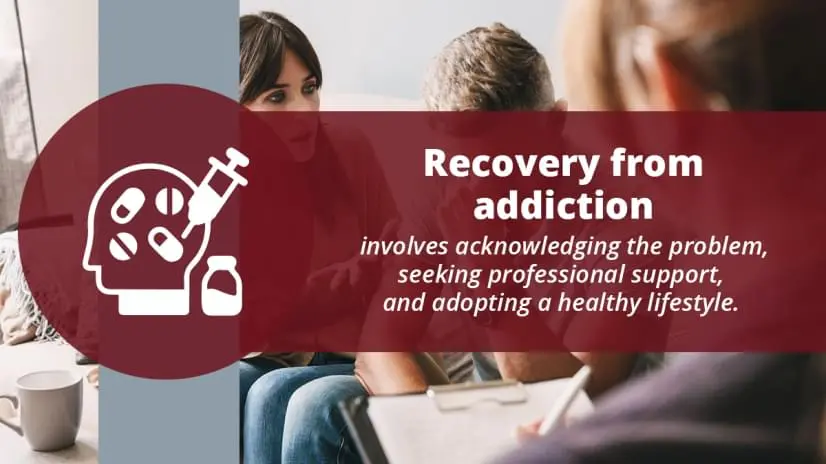
How Depression and Anxiety are Linked
Overcome depression and anxiety with personalized care at Indiana Center for Recovery. Find hope and healing today!

Addiction is a complex medical condition where individuals compulsively seek and use substances despite harmful consequences. Recovery from addiction is vital as it offers a chance to regain control over one’s life, repair relationships, and restore overall well-being.
The journey to recovery involves breaking free from the grip of substance abuse and adopting healthier coping mechanisms. In this article, we will explore the practical steps individuals can take to recover from the effects of drug addiction.

Addiction is a complex condition affecting various aspects of an individual’s life, but recovery is possible. Here is what you need to know:
Seek professional help at Indiana Center for Recovery for comprehensive addiction treatment. Call (844) 650-0064 to reserve your spot today.
Addiction is a complex and chronic disease characterized by the compulsive use of substances despite harmful consequences. It goes beyond mere physical dependence and involves psychological and behavioral components.
Individuals in active addiction often find it challenging to control their impulses, leading to a cycle of chronic substance use that can have severe repercussions on their health, relationships, and overall well-being.
Addiction is a gradual process that unfolds through distinct stages, each presenting unique challenges and implications. Let’s explore these stages:
It all begins with curiosity, as individuals experiment with substances. This stage involves trying drugs or alcohol for the first time, often influenced by peer pressure or a desire for novelty.
As experimentation turns into a pattern, regular use emerges. The individual may find themselves consuming substances more frequently, establishing a routine that integrates drugs or alcohol into their daily life.
An escalation in behavior marks the transition from regular use to risky use. During risky use, boundaries, like excessive consumption, disregarding safety precautions, or engaging in dangerous activities under the influence, are crossed. The hard lines that once existed are blurred. There is a marked change in behavior at this stage.
Dependence sets in when the body and mind adapt to the substance, leading to a perceived need for it. Withdrawal symptoms may arise, and individuals may find it challenging to control or stop their substance use.
The final stage is full-blown addiction, characterized by a loss of control over substance use. At this point, the individual’s life is significantly impacted, with relationships, work, and health suffering.
Early identification and intervention during the experimentation and regular use stages can help deter the progression toward dependence and full-blown addiction.
Recovery from addiction is vital for several reasons, as it significantly impacts an individual’s physical, mental, and social well-being.
Substance abuse can lead to severe physical and mental health issues. Recovery allows individuals to regain their physical health, mental clarity, and overall well-being. It provides an opportunity to address and manage co-occurring health issues.
Addiction often strains relationships with family, friends, and colleagues. Recovery fosters personal growth and enables individuals to rebuild trust and repair damaged relationships. It promotes healthier communication and interpersonal connections.
Substance abuse can impair cognitive function, decision-making, and all-around performance. Recovery allows individuals to regain focus, cognitive abilities, and productivity, leading to better functioning in various aspects of life, including work and education.
Substance abuse can contribute to emotional instability and mood disorders. Recovery provides individuals the tools and coping mechanisms to manage emotions, reduce stress, and maintain emotional stability.
Recovery is a transformative process that encourages personal growth and self-discovery. It provides an opportunity to redefine values, set goals, and work towards a more fulfilling and purposeful life.
Ultimately, recovery from drug use disorder leads to an improved quality of life. It allows individuals to experience joy, fulfillment, and a sense of purpose that may have been lost during active addiction.
Remember, recovery is a unique and ongoing process, and the path may vary for each individual. Proper treatment, counseling, and support from loved ones are often essential components of successful recovery.
Recovery from addiction is a challenging but achievable process that typically involves multiple steps. Here’s a breakdown of the general steps often involved in addiction recovery:
The first step involves acknowledging the presence of addiction and accepting the need for change. This self-awareness forms the foundation for the entire recovery process, allowing individuals to confront their challenges head-on.
No one needs to face addiction alone. Seeking help is a crucial step that involves reaching out to friends, family members, or professionals for support. This collaborative effort establishes a strong support network, a cornerstone in recovery.
Detoxification is the process of removing the substance from the body. Under medical supervision, individuals undergo a safe and gradual elimination of toxins. This step is vital in addressing the physical aspect of addiction and preparing for the next steps of recovery.
Rehabilitation comes next, offering structured programs for individuals to address the root causes of addiction. Inpatient programs offer immersive, round-the-clock support in a treatment facility, while outpatient programs allow flexibility for those maintaining daily responsibilities. Both treatment options focus on therapeutic interventions and skill-building for sustained recovery.
Maintaining sobriety involves ongoing efforts, including counseling, support groups, and positive lifestyle changes. Recognizing and avoiding triggers that may lead to relapse is crucial. This step emphasizes long-term strategies for sustaining a substance-free, fulfilling life.
Remember, recovery is a dynamic process, and people may progress through these steps at their own pace. By embracing these steps, individuals can not only overcome drug abuse and addiction but also cultivate a fulfilling and substance-free life.
Therapy is a powerful tool in the journey toward addiction recovery, offering individuals the support needed to break free from the cycle of substance abuse. Here’s a brief overview of some of the commonly used therapies:
Cognitive behavioral therapy (CBT) helps people identify and change negative feelings, thought patterns, and behaviors associated with addiction. By promoting self-awareness and developing healthier coping mechanisms, CBT empowers individuals to break free from destructive cycles.
Dialectical behavior therapy (DBT) focuses on building skills for emotional regulation, interpersonal effectiveness, and distress tolerance. It aids in managing intense emotions, reducing impulsivity, and enhancing overall well-being, crucial elements in addiction recovery.
Motivational enhancement therapy (MET) strengthens an individual’s motivation and commitment to change. By exploring personal goals and values, MET helps individuals recognize the importance of overcoming addiction and encourages positive decision-making.
Contingency management (CM) utilizes a reward system to reinforce positive behaviors and discourage substance use. This approach links tangible rewards to drug-free milestones, motivating individuals to stay committed to their recovery journey.
Group therapy fosters a sense of community and shared experiences. Participants gain support, understanding, and encouragement from peers facing similar challenges, creating a supportive “village” to fall back on when times get tough.
Family therapy sessions involve the individual’s family in the treatment process to address family dynamics and relationships impacted by addiction. It aims to improve communication, set boundaries, and provide education and support for both the individual and their family, fostering a healthier family environment.
Medications play an important role in addiction recovery by alleviating withdrawal symptoms, reducing drug cravings, and supporting individuals in maintaining sobriety. They are an essential component of a comprehensive treatment program, often combined with counseling and behavioral therapies.
Commonly used medications in the process of recovery include:
The importance of medications in addiction recovery lies in their ability to stabilize individuals physically, enabling them to engage more effectively in therapeutic interventions.
However, it’s crucial that medication-assisted treatment (MAT)is integrated into a comprehensive recovery plan, addressing the psychological and social aspects of substance use disorder (SUD) to promote lasting change.
Overcoming recovery challenges is not only achievable but also an integral part of the transformative journey toward lasting well-being.
Engaging in support groups, such as Narcotics Anonymous (NA) and Alcoholics Anonymous (AA), provides a sense of community and understanding. Shared experiences and mutual encouragement create a supportive environment where individuals can share insights, gain perspective, and find strength in unity.
Holistic approaches address the interconnectedness of mind, body, and spirit. Incorporating meditation, yoga, and mindfulness fosters overall well-being, aiding people in managing stress and promoting a balanced and holistic recovery.
Adopting a healthy lifestyle reinforces recovery by promoting physical and mental well-being. Regular exercise, balanced nutrition, and sufficient sleep contribute to increased energy levels, improved mood, and enhanced resilience in the face of recovery challenges.
Practicing self-compassion involves treating oneself with kindness and understanding. Acknowledging setbacks as part of the journey and learning from them, individuals can cultivate a positive mindset, fostering resilience and determination in recovery.
In addition to these strategies, personalized and professional guidance can be crucial. Combining these approaches creates a comprehensive and well-rounded strategy for overcoming challenges in recovery.
Recovery is a process that moves from acknowledgement of a problem, to treatment, to lifelong addiction management. Recovery involves:
The root cause of addiction is multifaceted, involving genetic, environmental, and psychological factors. It often stems from a complex interplay of genetic predisposition, trauma, mental health, and social influences.
Recovering from addiction starts at home, but it does not end there. Addictions are not due to a lack of willpower but rather a chronic psychological condition that may include a chemical dependence on substances. Ask your doctor if rehabilitation at Indiana Center for Recovery is the right move for you.
Are you feeling overwhelmed by substance use disorder (SUD)? There’s hope! Indiana Center for Recovery is here to guide you toward a drug-free life.
Our evidence-based interventions, like cognitive-behavioral therapy (CBT), dual diagnosis support, and holistic approaches, empower you on your journey to recovery.
Don’t let another day slip by. Contact us at (844) 650-0064 to reserve your spot in our program.